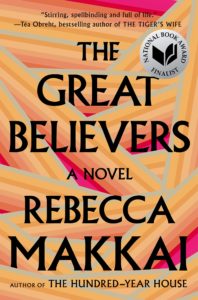What a great way to kick off the 2019 reading year.

The Great Believers by Rebecca Makkai is a dense, rich novel that toggles back and forth between Chicago in the mid-80s and Paris in 2015. The Chicago chapters follow a group of gay friends as AIDS ravages their community and upends their relationships, plans and careers. In 2015, one of the characters from the 80s chapters has come to Paris in search of her estranged daughter, and while there she reconnects with some of the people she knew in Chicago after her brother died of AIDS, one of the early deaths in the community.
I was too young in the 80s to truly grasp at the time how devastating AIDS was to the gay community, how it completely changed how these men lived their lives. The Great Believers brings it all into sharp focus, exploring how a positive diagnosis – and a negative one, for that matter – affected how they related to their partners and their friends. It’s hard to imagine a whole generation of men – many of whom had dealt with discrimination and estrangement from their own families – who were planning and looking forward to their futures, only to have them cut off in the cruelest and most painful way. Some passages I marked in the book:
“There was this tiny window where we were safer, and happier. I thought it was the beginning of something. When really it was the end.”
“If you got it from sleeping with a thousand guys, then it’s a judgment on your promiscuity. f you got it from sleeping with one guy once, that’s almost worse, it’s like a judgment on all of us, like the act itself is the problem and not the number of times you did it. And if you got it because you thought you couldn’t, it’s a judgment on your hubris. And if you got it because you knew you could and you didn’t care, it’s a judgment on how much you hate yourself.”
“Let’s enjoy it while it lasts. Because this isn’t Mother May I. You’re not always advancing. I know it feels that way right now, but it’s fragile. You might look back in fifty years and say, ‘That was the last great time.'”
“As he got sicker, it was more and more often that he thought of people – of Charlie, certainly, and of everyone else here or gone: not as the sum of all the disappointments, but as every beginning they’d ever represented, every promise.”
Devastating.
I got totally immersed in The Great Believers, finding myself thinking about these characters often when I wasn’t reading, worried about them and invested in how their lives would turn out. (I had to remind myself frequently that they weren’t real!) Makkai clearly did a lot of research, not just on AIDS and the gay community in the 80s, but also about art, which plays a big prominent role in the book. I also really appreciated her attention to detail, little observations that made the book so believable. She’s an incredibly talented writer.
In the end, The Great Believers is about friendship and loyalty, and how our devotion to one person or cause can have consequences in other parts of our lives. It’s a long book, one that requires attention and thought. It took me a long time to get through it, but it was an immersive and very satisfying read.










About Me
I have been blogging about books here at Everyday I Write the Book since 2006. I love to read, and I love to talk about books and what other people are reading.